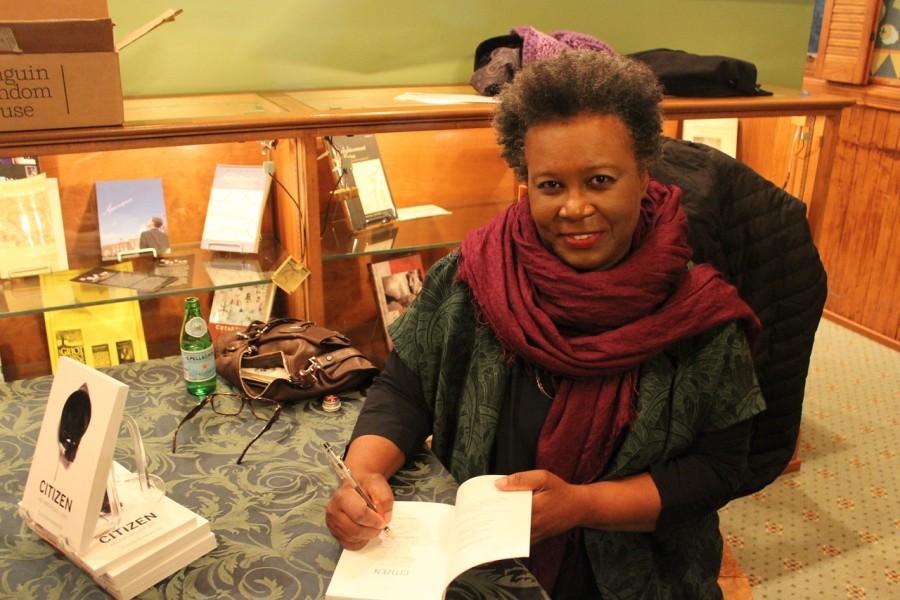Poet-in-residence Claudia Rankine attracts full house
February 5, 2016
“That was an uncomfortable, painful hour and I’m glad I had it,” former University president Gary Sojka said after attending Claudia Rankine’s poetry reading on Feb. 2.
Rankine was selected as the Poet-in-Residence for the 2015-16 academic year as part of one of the Stadler Center for Poetry’s longest-running programs. Referred to as a “timely fearless poet” when she was introduced, Rankine has published several plays, essays, and poem collections, including the award-winning book “Citizen: An American Lyric” in 2014.
Both “Citizen: An American Lyric” and Tuesday night’s presentation focused on the sensitive topic of racism and how it still haunts modern society, though not always in obvious ways.
“In content, the book documents incidents of everyday racism, inviting us to see what we’d prefer not to … The book warns us about our American racial imaginary that scripts the black body over and over again into derogatory clichés. By allowing us to experience the accumulation of racial incidents on page after page, the collection allows us to feel the burden that weighs on black subjects experiencing both invisibility and hyper-visbility,” Professor of English Harriet Pollack said.
“‘Citizen’ transcends genre boundaries and showcases the possibilities for poetry to speak to the most pressing and difficult political and social issues of our time as Americans and as global citizens,” Director of the Stadler Center for Poetry and Professor of English Shara McCallum said.
Rankine calls upon her readers not to be distracted by scandals involving murder and death, but instead analyze the subtle and sometimes overlooked ways racism pervades our daily lives.
“Even when you don’t know it, our white supremacist roots are infiltrating our culture all the time,” Rankine said.
Although we may not have blatantly racist legislation, like the Jim Crow laws, there exists “a kind of segregation that is inside many of our lives … we segregate in terms of who shows up in our houses; there are resources to schools and communities held back in the name of segregation,” Rankine said.
Rankine wrote “Citizen: An American Lyric” as a community document, interviewing her peers and recalling historical and recent events in the news. She conducted her research by asking her friends to recall instances when their ordinary life was disrupted by racism. One piece in the collection recalled her friend’s experience with a therapist, who upon seeing her at her doorstep, yelled at her to get away from her house, not assuming that she may be a client. She also recalled a time when she was pulled over with her white husband and was asked by the police officer how the two knew each other.
Rankine focused heavily on the idea of whiteness and the white imagination. She discussed how whiteness is marketed in our culture as a normality, when in reality it is a construction and a creation that white people need to claim as theirs. Using images and videos as tangible examples, she honed in on one image in particular: a photograph of the lynching of Thomas Shipp and Abram Smith in the American South in 1930. When including it in her book, Rankine removed the two victims in this photo because she was mainly interested in the white people attending the lynching and complicitly observing it. She argued that this level of complicity has remained with us through the present day and is allowing racism to continue.
“Even for those who may recognize this larger truth, on the personal level, it is difficult for each of us to acknowledge the ways in which we participate or are implicated in this system of inequality (as with any other like structures of injustice we perpetuate). It is painful to face a truth around race and power that Rankine’s work demands we confront in both our collective and individual selves: that we are not always as good as we might believe we are or hope to be,” McCallum said.
“Black people are being gunned down because the white imagination is running out of control,” Rankine said.
Prompted by a question in the Q&A session, Rankine affirmed her belief that people are only trapped in the white imagination if they do not understand it. Knowledge calls societal assumptions into question and provides an escape from the white imagination.
Rankine was also asked to explain her reasoning for the title of her collection, highlighting how “black people don’t and can’t hold the space of citizen” in our society. In “Citizen: An American Lyric” she depicts how black bodies are placed against sharp white backgrounds, making them feel as if they do not belong.
On Tuesday night, Bucknell Hall boasted a full house and the audience was highly receptive of Rankine’s presentation.
“We had a standing-room only crowd, which for a poet like Rankine is very much what we hope for and anticipate. The audience had a strong showing from the Bucknell community but also individuals from the local and regional area. This is a testament to the reach of Rankine’s work,” McCallum said.
“Several people spoke to me directly after the event or today to say that it had a profound impact on them. People used works like ‘unsettling, disturbing, transformative, thought-provoking, challenging, unforgettable’ to try to characterize the effect of her performance and her work on them as listeners and viewers,” McCallum said.
“I thought it was a very inspiring and powerful lecture, especially when she matched the poems from her story to the images of black violence,” Hannah Lijoi ’19 said.






















